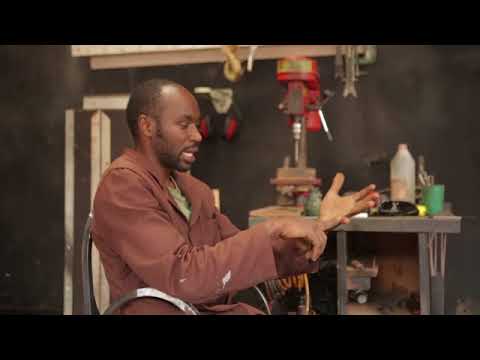BY JAMES KAHONGEH / BUSINESS DAILY
Paul Kihuha, 31, is an engineering marvel, gifted with a knack for making film props. He says his business is the first of its kind in Kenya.
Known as Protisa — from the name of his business, Protisa Creations —, fixing filming tools is his forte, giving film-makers an alternative to buying imported new kit whenever equipment breaks down.
“You won’t find this sort of equipment anywhere else in Kenya. Music and film producers usually have to buy new equipment. We are past that episode now,” he says with poise.
Mr Kihuha is the ninth child and last born in his family. Protisa is an acronym of “Product ‘Tisa”’ (Tisa is Kiswahili for nine, in his case talking about the position he takes in his family by birth, as ninth ‘product’).
“I worked as a cobbler and took odd jobs at construction sites for about three years after primary school. In 2012, a friend asked me to work with him at his workshop,” he recounts.
To get his enterprise off the ground, the owner of the workshop lent him Sh6,000, and some scrap metal.
“The first thing I made was a camera crane which I sold at Sh90,000; it was unbelievable. From this money, I established my own shed at home in Uthiru.” And Protisa Creations, now a registered company, was born.
Hiring props, visual effects and stunts and selling equipment such as car rigs, jibs and dollies to film-makers form the main streams of his income.
His studio in Uthiru, Kiambu County, tells his imagination acumen — it is filled with dummy daggers, grenades and guns, car rigs, cranes, dolls, steadicams, reflectors, name it.
“Sometimes you watch videos filmed locally and you can’t help but get embarrassed. Everything looks so unreal, so fake. But with real props and stunts, our film products can finally look real and believable.”
“I visit hardware shops to buy material for making my equipment, never to purchase finished products,” he explains.
Assembling equipment using readily available material such as scrap metal, used rubber and wood makes them cheaper, he says.
For Protisa owner, formal education was never going to give him what he wanted in life: professional independence. He stopped after primary school education to use craftsmanship for a race in employment life.
Renowned entrepreneurs and innovators who dropped out of school defend this action, saying formal education was delaying their journey to doing what they love.
“My late dad was a renowned blacksmith in our village. I would visit his workshop to watch him work. That’s how I got hooked,” he narrates.
“Art is magic. Sometimes I set off on a project whose end product I cannot deduce. My imagination leads me through stages and dimensions I have not explored before. But what comes out is always a splendid piece of art,” he says.
Sometimes he creates on a client’s request, sometimes he wanders to impress his artistic disposition. Either way, this allows him to explore.
“Not all works of art are sensible,” he philosophises. While neighbours dismissed him when he started the walk, Protisa has trudged on to create a flourishing business five years later.
“I make an average Sh150,000 every month from sale of props and for repair of others. This caters for all my financial needs. I’m adequately self-employed.”
Securing a licence for his business was a tough climb, sometimes “the government seeing me as a joker and some government officers ask for bribes to process my registration.”
Kenya spends billions of shillings on imports annually and has, for many years, been struggling to attain industrial edge and cut on the huge budget.
The government is now working on the Kenya Youth Employment and Opportunities Project, a jobs and training programme for those aged between 18 years and 29.

